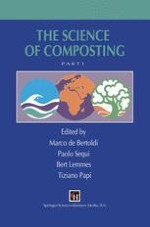1996 | OriginalPaper | Buchkapitel
The Effect of Red Mud on Metal Mobility in Anaerobically Digested Primary Sludge During Composting
verfasst von : Daniel Wong, Dr. Harrie Hofstede
Erschienen in: The Science of Composting
Verlag: Springer Netherlands
Enthalten in: Professional Book Archive
Aktivieren Sie unsere intelligente Suche, um passende Fachinhalte oder Patente zu finden.
Wählen Sie Textabschnitte aus um mit Künstlicher Intelligenz passenden Patente zu finden. powered by
Markieren Sie Textabschnitte, um KI-gestützt weitere passende Inhalte zu finden. powered by
Anaerobically digested primary sludge (ADPS) refers to the residue obtained after digestion of settled solids from primary wastewater treatment and contains significant levels of pathogens and heavy metals. Disposal of ADPS to land requires composting to reduce pathogens. Land disposal is restricted by total heavy metal content in the sludge. Total metal levels in the sludge can increase during composting as the associated organic matter is decomposed. Heavy metals in the sludge (eg copper), during anaerobic digestion are present in their insoluble reduced forms such as sulphides. During composting, the metals in the sludge become more soluble due to the oxidation of sulphides to sulphates. In addition, decomposition of organic matter and acidification as a result of sulphide oxidation during composting can increase metal mobility in the sludge (Qiao, In Progress). Land application of this compost could thus result in a significant mobilisation of metals into the soil from the compost. The accumulation of metals in soils may result in phytotoxic effects or harm consumers of the contaminated crops (Garcia et al., 1990). In addition, groundwater can also be contaminated by heavy metals leaching into the water table.
